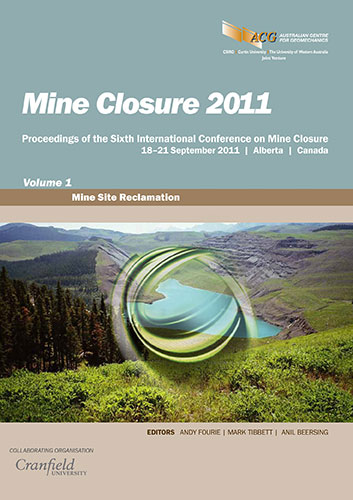Knowledge transfer process – wetland reclamation research in the Alberta oil sands

|
Authors: Hornung, J; Wytrykush, C; Haekel, G; Charette, T; Trites, M |
DOI https://doi.org/10.36487/ACG_rep/1152_61A_Hornung
Cite As:
Hornung, J, Wytrykush, C, Haekel, G, Charette, T & Trites, M 2011, 'Knowledge transfer process – wetland reclamation research in the Alberta oil sands', in AB Fourie, M Tibbett & A Beersing (eds), Mine Closure 2011: Proceedings of the Sixth International Conference on Mine Closure, Australian Centre for Geomechanics, Perth, pp. 573-580, https://doi.org/10.36487/ACG_rep/1152_61A_Hornung
Abstract:
To inform a comprehensive revision of the Guideline for Wetland Establishment on Reclaimed Oil Sand Leases document, as produced by the Cumulative Environmental Management Association, a knowledge transfer was initiated in 2008 to capture several years of wetland research results. Subject matter experts, consisting of professors and researchers from academic institutions, were asked to participate in a multi-year process to review, interpret and synthesise results on marsh (open water wetland) reclamation and research in the oil sands region. To best capture the research findings to date, and to ensure that the results of the knowledge transfer could be applied directly to oil sands reclamation, a question-specific approach was adopted where four direct questions were asked of the expert groups. Mine reclamation specific results will be incorporated into the next Wetland Guidelines manual, while a comprehensive treatment of the knowledge transfer results is expected to be published in a peer reviewed journal shortly afterwards. The task group gleaned several integral methodological characteristics of this approach if it is to be utilised: the directors of the process need an intimate understanding of the subject matter and preferably a relationship with the subject matter experts. Financial resources are significant, while time allocation from the task group is even more significant. Buy-in from the subject matter experts through legitimisation and incentives (beyond stipends) are essential, and should be continually reinforced to ensure continued success. Specific knowledge relation tools, such as conceptual diagrams and fuzzy cognitive mapping, are excellent assets and should be explored and utilised where possible in the knowledge transfer process.
References:
Alberta Environment (2008) Guideline for wetland establishment on reclaimed oil sands leases (2nd edition), prepared by M.L. Harris of Lorax Environmental for the Wetlands and Aquatics Subgroup of the Reclamation Working Group of the Cumulative Environmental Management Association, Fort McMurray, AB, December 2007. The document is available at: .
Bero, L.A., Grilli, R., Grimshaw, J.M., Harvey, E., Oxman, A.D. and Thomson, M.A. (1998) Closing the gap between research and practice: an overview of systematic reviews of interventions to promote the implementation of research findings, British Medical Journal, Vol. 317, pp. 465–468.
Dobbins, M., DeCorby, K. and Twiddy, T. (2004) A knowledge transfer strategy for public health decision makers, Worldviews on Evidence-Based Nursing, Second Quarter 2004, pp. 120–128.
Giles, B.G., Haas, G., Sajna, M. and Findlay, C.S. (2008) Exploring aboriginal views of health using fuzzy cognitive maps and transitive closure, A case study of the determinants of diabetes, Canadian Journal of Public Health, Vol. 99(5), pp. 411–417.
Hobbs, B.F., Ludsin, S.A., Knight, R.L., Ryan, P.A., Biberhofer, J. and Ciborowski, J.J.H. (2002) Fuzzy cognitive mapping as a tool to define management objectives for complex ecosystems, Ecological Applications, Vol. 12(5), pp.1548–1565.
Lavis, J.N., Rovertson, D., Woodside, J.M. and McLeod, C.B. (2003) How can research organizations more effectively transfer knowledge to decision makers? The Milbank Quarterly, Vol. 81, pp. 221–248.
Mitton, C., Adair, C.E., McKenzie, E., Patten, S.B. and Waye-Perry, B. (2007) Knowledge transfer and exchange: review and synthesis of the literature, The Milbank Quarterly, Vol. 85, pp. 729–768.
Perera, A.H., Buse, L.J. and Crow, T.R. (eds) (2006) Forest Landscape Ecology–Transferring Knowledge to Practice, Springer Science + Business Media, LLC, New York, 215 pp.
The Provincial Centre of Excellence for Child and Youth Mental Health at CHEO (2006) Doing More With What You Know, Ottawa, Ontario, viewed 1 June 2011, .
© Copyright 2024, Australian Centre for Geomechanics (ACG), The University of Western Australia. All rights reserved.
View copyright/legal information
Please direct any queries or error reports to repository-acg@uwa.edu.au
View copyright/legal information
Please direct any queries or error reports to repository-acg@uwa.edu.au